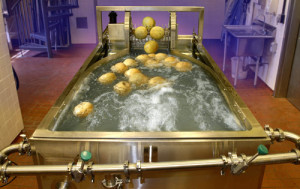Fresh produce continues to be the source of too many people barfing. Part of the solution is supposed to more government oversight of fresh produce production in the U.S., part of the Food Safety Modernization Act. But even if money is available to fund the activities, farm groups across the country are registering their disproval.
According to Lancaster Online, the U.S. Food and Drug Administration estimates the new regulations could cost farmers more than $459  million a year to implement.
million a year to implement.
But, says the FDA, they would prevent 1.75 million new cases of foodborne illnesses a year, saving $1.04 billion in associated costs.
And while most people at a recent Pennsylvania meeting agreed that food safety is a top priority, they said that when it comes to the proposed produce rule, the “devil is in the details.”
Lee Showalter, food safety manager for Rice Fruit Co. in Gardners, questioned what impact the produce rule would have on fruit growers, who are part of a low-risk industry.
No foodborne illness outbreaks have been attributed to tree fruit, he said.
“There is no difference in the provision when it comes to varying risks between produce,” Showalter said.
Frequent testing of water, which FDA claims is needed because it can carry foodborne illness pathogens, could be costly because many fruit growers depend on multiple water sources for their orchards, he said.
Water treatment also could create problems with applying sprays to control disease and insects, according to Showalter.
Philly.com reports that as the nation’s farmers enter a new growing season two years after 33 people died and 147 people were sickened in 28 states after eating listeria-infested cantaloupe from a Colorado farm, the produce industry has effectively delayed implementation of a law intended to improve food safety.
The United Fresh Produce Association, which describes itself as “industry’s leading trade association committed to driving the growth and success of produce companies and their partners” spearheaded the push for more time to comment on a pair of FDA rules toughening safety standards for farms and processors.
Whenever the federal legislation is enacted, cantaloupe growers can expect super special attention.
GPB News reports that FDA recently put growers and industry groups on notice to expect them.
The FDA’s focus on cantaloupe safety comes after two outbreaks of listeria and salmonella contamination in the last few years made hundreds of people ill and killed dozens.
A new coalition of cantaloupe producers from Georgia, Indiana and North Carolina is one of the industry’s responses to those outbreaks.  The group’s leader said it also reflects a desire among producers to improve safety.
The group’s leader said it also reflects a desire among producers to improve safety.
“They felt a need to identify how they could improve and enhance the confidence of the consumer in the cantaloupe product,” said Charles Hall, executive director of the ECGA. “We were seeing a trend of consumption going down somewhat.”
Hall said members of the group agree to undergo an initial food-safety audit — called a Global Food Safety Initiative audit — and then a later unannounced one.
Others argue that if FDA is going to up requirements, then FDA needs to up it’s own game.
For example, as reported in The Packer, Bedner Growers Inc., Delray Beach, Fla., voluntarily recalled 1,610 boxes of fresh green bell peppers because they were potentially contaminated with salmonella.
Bedner harvested and shipped the peppers March 25. They are marked with the lot code 102 on the side of each box, according to an April 26 news release from the company.
No illnesses have been reported in connection with the recall and no other
Bedner officials initiated the recall within hours of receiving notification from the Food and Drug Administration “late on April 25,” the release said.
The FDA told company officials a single sample taken April 4 had tested positive for salmonella. Government officials took the sample before the produce reached a retail outlet, but they did not inform Bedner Growers of the sample test until April 25.
